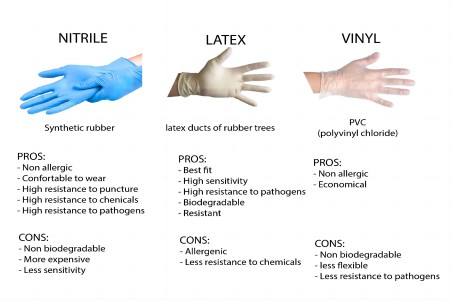Vinyl vs Latex vs Nitrile Gloves
Published on 2022/12/9

Share to:
Vinyl vs Latex vs Nitrile Gloves
When selecting the right glove, it’s important to consider the hazards present in the work environment, as well as the type of work you do.
Many workers in manufacturing or food service environments wear gloves to prevent their hands from getting dirty. Different types of gloves are available to meet different needs. Depending on the industry, there could be some general guidelines for selecting the right type of glove, but in many cases, it is best to consult with your supervisor before making a decision. When working in an industrial environment with hazardous chemicals, it’s essential to have the right type of glove. In this article, we will discuss the differences between vinyl gloves, latex gloves and nitrile gloves, with examples as well as a recommendation for which one to use in various situations.
Vinyl Gloves
Vinyl gloves are the most common type used in manufacturing environments. They are often used with paper, wood, or food products, as they are less likely to cause allergies than latex gloves. They are frequently used in cold environments, as they are very durable and resistant to oils, solvents, bacteria, and chemicals. Manufacturing environments where vinyl gloves are used include food production, pharmaceutical manufacturing, foundries, chemical processing, and other industries where the products are highly susceptible to microbial contamination.
Latex Gloves
Latex gloves are one of the most commonly used medical gloves. They are hypoallergenic and generally more comfortable than vinyl gloves. They are particularly useful for handling blood, blood-related products, and other biological materials. Although these gloves are often used in hospitals, they can also be found in a range of industries, including food, healthcare, healthcare-related, pharmaceutical and cosmetics manufacturing.
Nitrile Gloves
Nitrile gloves are the most commonly used glove type in hospitals, but they are also used in a range of industries, including food and healthcare. Nitrile gloves are also used in surgical environments and are less likely to cause allergic reactions than latex gloves. They are also generally more comfortable than latex gloves. Like latex gloves, nitrile gloves are also available in different materials, including standard nitrile and a thinner, latex-like material called Mylar. Nitrile gloves are also available with a variety of hand prints, which help manage patient expectations.
Differences Between Nitrile and Vinyl Gloves
Thickness: Nitrile gloves are often thinner than latex gloves, and are more comfortable for certain types of work, such as those involving delicate handling of food products.
Durability: Nitrile gloves are more durable than vinyl gloves, as they are made from silicone.
Sensitivity: Nitrile gloves are generally less sensitive than latex gloves, as they do not contain natural rubber particles.
Comfort: Nitrile gloves generally provide more comfort than latex gloves.
Cost: Nitrile gloves are more expensive than vinyl gloves.
Health-Permitting: Some manufacturers make a variety of latex products with additives that could potentially cause a reaction in people with latex allergies. The nitrile glove material is generally not made with additives.
Handprint: Some manufacturers make latex gloves with a variety of handprints, which make it easier for physicians to identify gloves among a stack of gloves in a medicine cabinet or on a shelf. Nitrile gloves do not generally have handprints.
Wear: Nitrile gloves generally fit one glove per hand, whereas vinyl gloves can fit either hand.
Recommendation
In general, latex gloves are most suitable for industries that use food products, where there is a risk of contamination from microbial pathogens. In these industries, it is important to wear rubber gloves that do not contain natural rubber particles, as these gloves are generally less likely to cause allergic reactions than latex gloves. Nitrile gloves are the preferred glove type for handling blood, blood-related products, and other delicate materials. When selecting the right glove, it’s important to consider the hazards present in the work environment, as well as the type of work you do.


 WhatsApp
WhatsApp
Send us your message
You can send an email asking for the price and detailed information of this product. We will reply you as soon as we receive your email